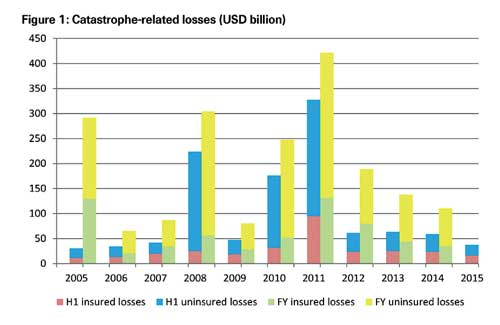Friday Feb 27, 2026
Friday Feb 27, 2026
Tuesday, 27 October 2015 00:41 - - {{hitsCtrl.values.hits}}
According to preliminary sigma estimates, total economic losses from natural catastrophes and man-made disasters reached $ 37 billion in the first half of 2015.
The global insurance industry covered nearly 45% ($ 16.5 billion) of these losses, which is higher than the previous 10-year average cover of 27%.
Around 18 000 people lost their lives in disaster events in H1 2015, up from more than 4 800 in the first half of last year. The earthquakes in Nepal, and a heat wave in India and Pakistan, claimed the highest number of victims.
 Natural catastrophes caused total economic losses of $ 33 billion in the first half of the year, well below the $ 54 billion in H1 2014 and also the average first-half year loss over the previous 10 years ($ 99 billion).
Natural catastrophes caused total economic losses of $ 33 billion in the first half of the year, well below the $ 54 billion in H1 2014 and also the average first-half year loss over the previous 10 years ($ 99 billion).
Of the overall insured losses, $ 12.9 billion came from natural disasters, down from nearly $ 20 billion in H1 2014 and again below the average first-half year loss of the previous 10 years ($ 25 billion).
The costliest natural catastrophes for the insurance industry resulted from severe winter weather and thunderstorms in the US and Europe. In February, a winter storm in the north-eastern US caused insurance losses of $ 1.8 billion, the highest loss of any event so far this year.
Man-made disasters, meanwhile, triggered an additional $ 3.6 billion in overall insurance losses in H1 2015.
Earthquakes and soaring temperatures claim thousands of lives Disaster events claimed many lives in the first six months of 2015.
In all, around 18,000 people lost their lives. There were more than 9,000 fatalities in the earthquakes that struck Nepal in close succession in April and May, the largest loss of life due to any natural catastrophes so far this year. The quakes also left many people homeless.
The economic losses in Nepal are estimated to be more than $ 5 billion. Of those, only around $ 160 million were insured losses.
“The tragic events in Nepal are a reminder of the utility of insurance,” says Kurt Karl, Chief Economist at Swiss Re. “Insurance cover does not lessen the emotional trauma that natural catastrophes inflict, but it can help people better manage the financial fallout from disasters so they can start to rebuild their lives.”
In the same region, India and Pakistan were hit by a severe heat wave in May and June. Temperatures soared to 48°C, the highest recorded since 1995. It is estimated that more than 2,500 people died in India and 1,500 in Pakistan as a result of the extreme heat.
Another factor in the high number of victims of disaster events in the first half of this year is the number of migrants who have died attempting to reach Europe from conflict zones in northern Africa, often in unseaworthy vessels. In search of a better life, sadly these people have instead lost their lives as the boats capsized while carrying them across the Mediterranean.